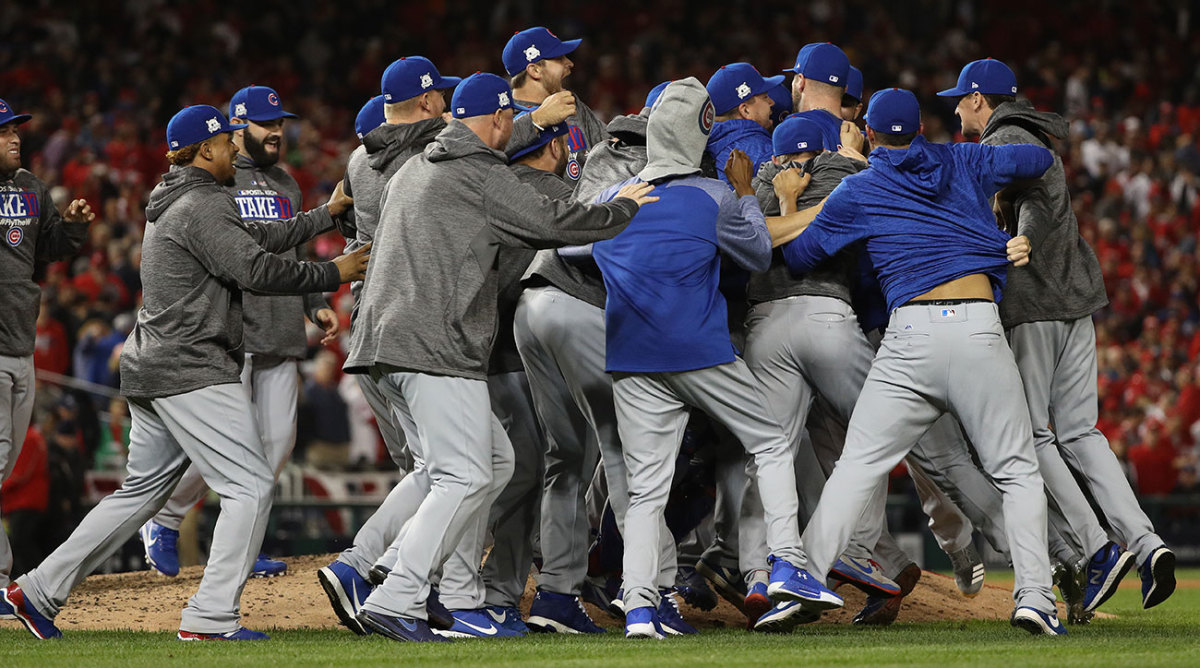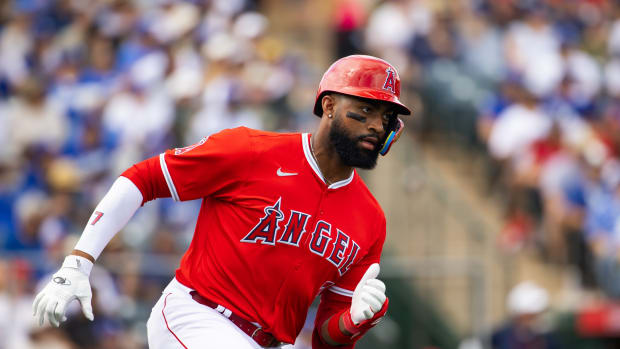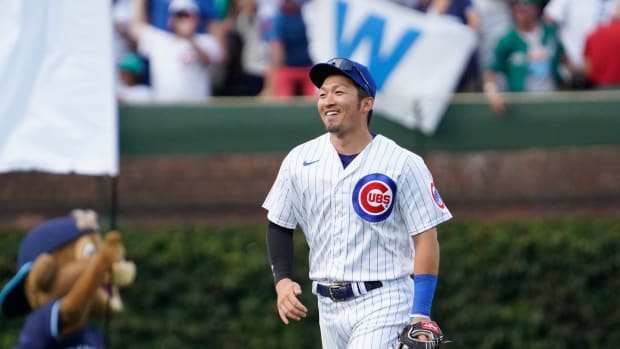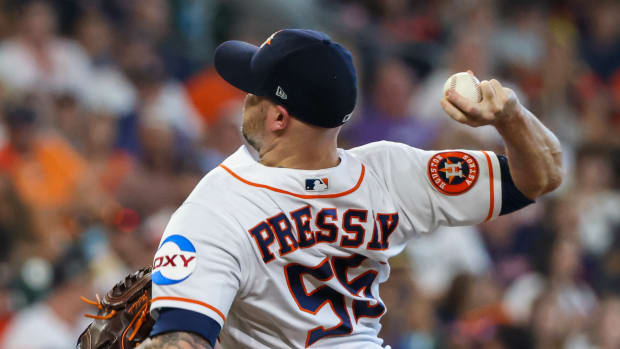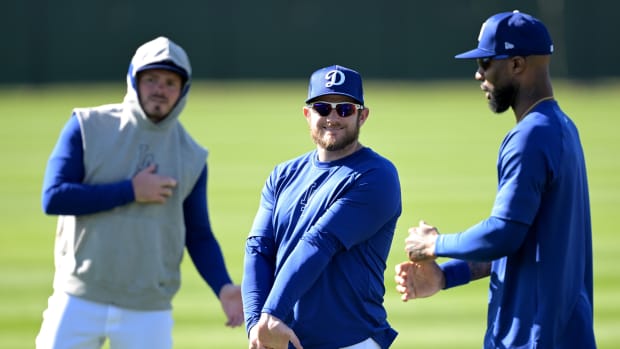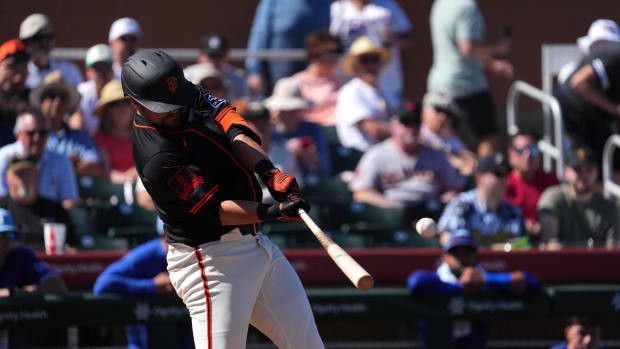Cubs Set Up NLCS Rematch After Topping Nationals in Wild Game 5
Where do you start? It was equal parts tense and slack, brilliant and stupid, perfectly organized and idiotically executed. NLDS Game 5 was an instant classic and a complete disaster. It was the most savage postseason loss yet for the Nationals in a franchise history already full of the kind of defeats that make you question the existence of any merciful higher power. It was a narrow escape for a Cubs team that looked far from its championship self all series long yet still rallied to overcome an early deficit on Thursday night and barely held on to a 9–8 win that took four hours and 37 minutes. It felt like it lasted three times as long.
The result: Chicago advances to the NLCS to face the Dodgers in a rematch of last year’s pennant series.
1. Nationals Finished In The Fifth
When the Nationals dissect this season to find out where it went wrong, they’ll get to the fifth inning of Game 5 and fall to pieces. Over the course of seven batters and an agonizing, miserable, borderline surreal half hour, Washington’s entire season went off the rails, careened into a ditch, landed in a puddle of gasoline and burst into flames. When the fire died down, there was nothing left to save—only the charred remains of another year brought to a crashing halt in the Division Series.
It was all set up for success. Gio Gonzalez had survived three shaky innings with a lead intact. Matt Albers had pitched a perfect fourth. Now here was Max Scherzer, fresh off a dominant start in Game 3, coming out of the bullpen with a 4–3 lead and ready to carry the Nationals into the late innings. Throwing as hard as he ever has—he hit 98 mph with regularity in the fifth—Scherzer was going to be the miracle man of the middle innings. He got Kris Bryant to ground out to shortstop. He got Anthony Rizzo to fly out to centerfield. One more out, and Washington would be 12 away from winning its first-ever postseason series.
Umpires May Have Missed Call On Javier Baez Strikeout, Addison Russell Run
Then it all slowly came apart. Willson Contreras reached on an infield single to Trea Turner at short. Pinch-hitter Ben Zobrist blooped a single in front of Jayson Werth in left. On the first pitch he saw, Addison Russell ripped a double down the third-base line, just past a diving Anthony Rendon, to tie the game at four. Nationals Park, so recently boisterous, fell into a stunned silence.
From there, things only got worse and sloppier. Despite the fact that he entered the night as a .165 hitter in 32 playoff games and had twice already ended Cubs rallies earlier in the game, Jason Heyward was intentionally walked. The free-swinging Javy Baez swung through three Scherzer offerings—only for the third strike to get by Matt Wieters, who made his own contribution to the car crash by throwing wild of first, allowing Russell to score. Wieters wasn’t done: His glove caught pinch-hitter Tommy La Stella’s bat in the next at-bat, loading the bases on catcher's interference. And then Scherzer put the finishing touch on the frame, hitting Jon Jay with a slider to force in the third and final run of the inning.
There are 19th-century Russian tragic novels that aren’t as bleak as that inning was for Washington. Three runs across, coming on an infield single, a bloop, two errors by the catcher (one on the strikeout that would’ve ended the frame with the game still tied) and a hit-by-pitch, all against the best pitcher the Nationals had to offer. You could almost imagine Dusty Baker sitting in the home dugout, wondering which deity he had offended so badly to deserve something like this.
There were more runs scored on both sides from there, with the Nationals rallying several times to narrow the gap, but it didn’t end up mattering. Game 5 was decided in that cursed fifth. Thanks to the most hellish blooper reel you will ever see, the Nationals once again blew a lead and came up short of the NLCS. Add it to the impossibly long list of October gut punches for a franchise that can’t seem to avoid them.
2. Sloppy Cubs Nonetheless Survive
The Cubs advanced, but it was hardly a straight path from first pitch to champagne. Trailing 4–1 after two innings, Chicago rallied in the third and in that bizarre fifth, then tacked on a pair of insurance runs in the two following frames, but the Cubs seemed determined to give their new lead away. Hendricks barely survived his four innings, yielding those four runs on a pair of homers (albeit with seven strikeouts), making fans wonder why manager Joe Maddon was sticking with him in an elimination game despite having starters Jose Quintana and John Lackey available in the bullpen. And once Hendricks departed, Maddon oddly bypassed Quintana, going to short relievers Brian Duensing, Pedro Strop and Mike Montgomery to try to bridge the middle innings.
Watch: Michael A. Taylor Goes Deep To Give Nationals 4-1 Lead in NLDS Game 5
That trio combined for only six outs, with Montgomery giving up a run on two hits and two walks in the sixth. Now holding a 9–6 lead in the seventh, Maddon went to Carl Edwards Jr., who was wild in Game 4 and had been hit hard in Game 2. But after five pitches, four of which were nowhere near the strike zone, out came Edwards and in came Quintana.
It’s clear that Maddon was trying to avoid using Quintana, who had started Game 3 and was in line to take the ball for NLCS Game 1 opposite Clayton Kershaw, but with his trusted middle and late relief options all exhausted or burned, he had no choice. But Quintana—who hadn’t come out of the bullpen since his rookie season in 2012—struggled to throw strikes, and Maddon didn’t stick with him long: After a groundout, a hit, a walk, and a bases-loaded sacrifice fly by Bryce Harper, Maddon called on closer Wade Davis for a seven-out save in a two-run game.
It’s hard to understand exactly how Maddon painted himself into that corner, asking Davis to record more outs than he had in years with no trustworthy backup if things went wrong. And wrong they went once Davis, clearly struggling with his command after cleaning up Quintana’s mess in the seventh inning, allowed a run in the eighth and found himself into a two-on, two-out situation. He was bailed out, though, by a replay review of a pickoff play at first—a ticky-tack overturn of Jose Lobaton’s foot momentarily coming off the base while Anthony Rizzo kept the tag on. Davis then finished saving Maddon’s bacon by working a 1-2-3 ninth and striking out Harper to end it. He ended up with 44 pitches on the night—the most he’d thrown since converting to relief four seasons ago.
John Farrell Ran Out of Time Under the Current Red Sox Regime
The Cubs manager burned his NLCS Game 1 starter for four batters in relief. He made his closer throw nearly 50 pitches with no margin for error. He tinkered and meddled and got wacky, and somehow it worked. He wandered into a minefield blindfolded and somehow exited with all his limbs intact. He’s proof that sometimes it’s better to be lucky than strategic.
3. Dodgers-Cubs NLCS, Take Two
As noted, this year’s NLCS is a replay of last season’s, when the Cubs overcame a 2–1 series deficit to win their first pennant since 1945, wrapping it up by clubbing Kershaw in a raucous Game 6 at Wrigley Field. Chicago was the favorite in that series, thanks in part to Los Angeles having to grind its way through a brutal, exhausting five-game Division Series against … the Washington Nationals.
Kershaw was unavailable for last year’s Game 1, having heroically closed out NLDS Game 5; in his stead, the Dodgers had to start rookie Kenta Maeda, who struggled mightily through four innings before giving way to a worn-out L.A. bullpen that couldn’t finish the job. The tables will be turned almost 180 degrees this time around: The Dodgers come into the NLCS with home-field advantage and are fully rested and confident after easily dispatching the Diamondbacks in the first round, while the Cubs will limp into Southern California in mild disarray. Especially concerning for Maddon has to be the fact that, as of now, his likely Game 1 starter is Lackey, who didn’t take the ball once in the Division Series and was awful in the regular season.
Quintana should be available to some degree, but he will be the only other starter Maddon can likely turn to. How effective Davis will be after his marathon Game 5 outing on just a day of rest remains to be seen. And Maddon still has yet to find a reliable late-innings formula for his bullpen, which blew Game 2 late, was tagged in Game 4 and nearly spit the bit in the finale. The Cubs will come into the NLCS as the defending champions, but they are in a vulnerable position, and Kershaw and Los Angeles are well suited to put them in an early series hole.






























